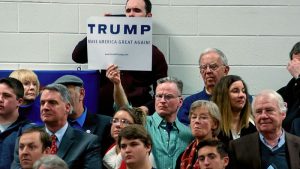
The night after the presidential election, I went to a “brainstorming and prayer” session held in an evangelical church where I am conducting research. Church members felt it was important to come together in a season of transition for the church and the nation, both of which are experiencing a change in leadership. I sat in a circle of parishioners, notebook and pen in my lap. The first person to speak was a retired aeronautical engineer. The white, straight, 65 year-old veteran sighed in relief and bowed his head as he said “I can sleep again at night now.”
Church members discussed renewed feelings of job security. They prayed for those within their church and for the empty seats they would soon fill. They rejoiced in their happiness for what is happening in the country. One woman prayed, “We can elect a pastor, and we can elect a president, but we already have a KING.” None of the conversations focused on Trump’s religious values. Trump’s appeal lay in his secular ability to advocate for them so that they can, in turn, continue to do the work important to them as active evangelicals.
Their prayers and hopes for the next four years reminded me of Arlie Hochschild’s recent work in rural Louisiana, where she uncovered what she calls the deep story of disenfranchised rural tea-party supporters. She suggests that Donald Trump might provide what she calls a “secular rapture” for many in the United States who feel as though their economic and social world is changing. Hochschild argues that the sense of being invisible and forgotten she witnessed among white working and middle-class individuals might indeed be a major factor in Trump’s appeal.
President-elect Donald Trump had the largest share of evangelical votes of any presidential candidate. My current research suggests that members of the evangelical community feel as though they live in a different world than many of us—a world in which they perceive themselves as losing their voice (see here, here, and here). Given those feelings of disenfranchisement, what appeal did a presidential candidate with unclear, and often seemingly un-Christian values hold?
I ask this question as a nonreligious individual researching evangelicals—I think many others ask it too. People ask me what it is like to be a woman, a feminist academic, and nonreligious in these spaces, spaces in which evangelizing is the point. My first response to those queries is that my gender identity does not matter much to those I study. My religious identity—and lack of one—matters much more to them. The reason for the salience of my nonreligious identity is perhaps similar to the reasons we saw such a large evangelical voter turnout.
In my larger research project on gender and sexuality within the evangelical church, I find evidence for what I call an imagined secular heterosexuality. Members of this church community discuss and debate married life and family life in relation to, and against, what they perceive to exist in an outside secular world. These conversations transcend concerns and understandings of life in the home. As an outside member of the secular world, I am seen not only as a researcher, but also as someone who can bridge a gap between their world and the secular world in which they no longer feel they have a voice.
There’s overlap between what I call the imagined secular and what Hochschild predicted as a secular rapture. Both terms highlight a strongly felt divide in the United States. Where evangelicals feel they are living in a separate world—one in which their economic, political, and social needs and beliefs are silenced—Trump may provide the voice they want back. And whether we speak of tea party supporters in rural Louisiana or ardent evangelicals in suburban Washington state, we must attend to the intersections of whiteness, religion, and felt disenfranchisement to understand the evangelical voter turnout we witnessed, and what that turnout now means for the upcoming moral, religious and political debates our country faces.
Sarah Diefendorf is a doctoral candidate in the Department of Sociology at the University of Washington, where she researches constructions of gender and sexuality in religious communities. You can find more of her work here: www.sarahdief.com

Comments